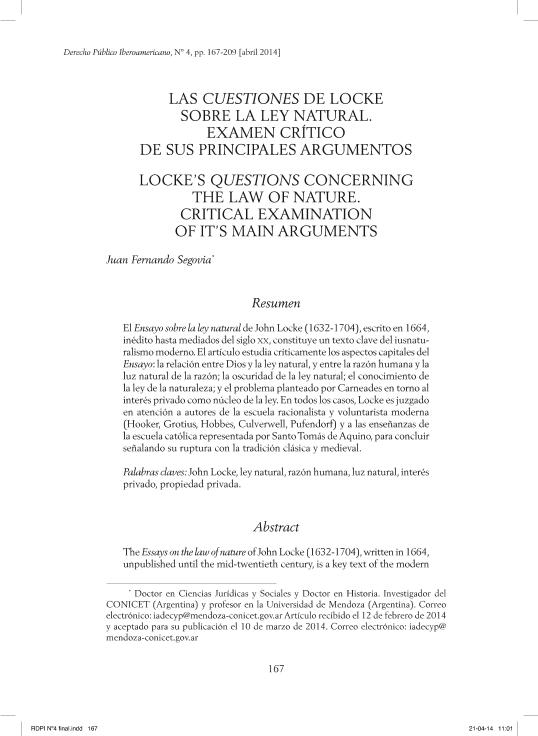Mostrar el registro sencillo del ítem
dc.contributor.author
Segovia, Juan Fernando

dc.date.available
2017-07-12T21:44:32Z
dc.date.issued
2014-04
dc.identifier.citation
Segovia, Juan Fernando; Las cuestiones de Locke sobre la ley natural: Examen crítico de sus principales argumentos; Universidad del Desarrollo; Derecho Público Iberoamericano; 2; 4; 4-2014; 167-209
dc.identifier.issn
0719-2959
dc.identifier.uri
http://hdl.handle.net/11336/20303
dc.description.abstract
El Ensayo sobre la ley natural de John Locke (1632-1704), escrito en 1664, inédito hasta mediados del siglo xx, constituye un texto clave del iusnaturalismo moderno. El artículo estudia críticamente los aspectos capitales del Ensayo: la relación entre Dios y la ley natural, y entre la razón humana y la luz natural de la razón; la oscuridad de la ley natural; el conocimiento de la ley de la naturaleza; y el problema planteado por Carneades en torno al interés privado como núcleo de la ley. En todos los casos, Locke es juzgado en atención a autores de la escuela racionalista y voluntarista moderna (Hooker, Grotius, Hobbes, Culverwell, Pufendorf) y a las enseñanzas de la escuela católica representada por Santo Tomás de Aquino, para concluir señalando su ruptura con la tradición clásica y medieval.
dc.description.abstract
The Essays on the law of nature of John Locke (1632-1704), written in 1664, unpublished until the mid-twentieth century, is a key text of the modern natural law doctrines. The article critically examines capital aspects of the Essays: the relationship between God and the natural law, and between human reason and the natural light of reason; the darkness of the natural law; the knowledge of the law of nature; and the problem posed by Carneades around the private interest as the core of law. In all cases, Locke is judged in attention to authors of the rationalist and voluntarist modern school (Hooker, Grotius, Hobbes, Culverwell, Pufendorf) and the teachings of the Catholic school represented by Holy Thomas of Aquinas, to conclude by pointing out his break with the classical and medieval tradition.
dc.format
application/pdf
dc.language.iso
spa
dc.publisher
Universidad del Desarrollo
dc.rights
info:eu-repo/semantics/openAccess
dc.rights.uri
https://creativecommons.org/licenses/by-nc-sa/2.5/ar/
dc.subject
John Locke
dc.subject
Ley Natural
dc.subject
Razon Humana
dc.subject
Luz Natural
dc.subject
Law of Nature
dc.subject
Human Reason
dc.subject
Light of Nature
dc.subject
Private Interest
dc.subject
Private Property
dc.subject.classification
Ética

dc.subject.classification
Filosofía, Ética y Religión

dc.subject.classification
HUMANIDADES

dc.title
Las cuestiones de Locke sobre la ley natural: Examen crítico de sus principales argumentos
dc.title
Locke´s questions concerning the law of nature: Critical examination of it's main arguments
dc.type
info:eu-repo/semantics/article
dc.type
info:ar-repo/semantics/artículo
dc.type
info:eu-repo/semantics/publishedVersion
dc.date.updated
2017-07-10T13:24:58Z
dc.journal.volume
2
dc.journal.number
4
dc.journal.pagination
167-209
dc.journal.pais
Chile

dc.journal.ciudad
Santiago
dc.description.fil
Fil: Segovia, Juan Fernando. Consejo Nacional de Investigaciones Científicas y Técnicas. Centro Científico Tecnológico Conicet - Mendoza. Instituto de Ciencias Humanas, Sociales y Ambientales; Argentina
dc.journal.title
Derecho Público Iberoamericano
dc.relation.alternativeid
info:eu-repo/semantics/altIdentifier/url/https://dialnet.unirioja.es/servlet/articulo?codigo=4790074
Archivos asociados
